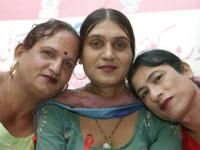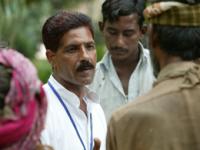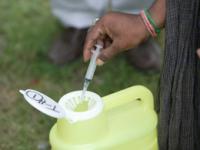
Peer outreach workers, Infection Control Society of Pakistan, Karachi.
Credit: UNAIDS/P. Virot
In a move to counter social exclusion and change discriminatory practices, a dialogue has begun in Pakistan between the government, parliamentarians and communities often overlooked by policymakers. An historic meeting was held late last month when a number of parliamentarians began a dialogue with community members on the challenges facing transgendered people, people who use drugs and people living with HIV. This meeting was a first, and aimed to create an enabling environment for policy changes related to HIV.
Among the general population in Pakistan HIV prevalence is less than 0.1%, however results from the recent HIV Second Generation Surveillance in the country indicate that injecting drug users and the transgender community are the two populations with the highest rate of HIV infection in the country, with an estimated 20% and 7% prevalence respectively. HIV infection is not the sole concern of these populations who can also be caught up in a cycle of social and economic exclusion exposing them to marginalization and violence, limited access to health and others services, and, for drug users, a lack of drug substitution programmes.
Leadership shown by a few, through a courageous dialogue with parliamentarians represent a voice of change for countless others.
Oussama Tawil, UNAIDS Country Coordinator for Pakistan
The dialogue, held at a parliamentary sub-committee level, brought together parliamentarians from across party lines; associations and groups representing people living with HIV such as the Red Ribbon Initiative, Pak Plus and New Light AIDS Control Society; the Sathi Foundation for transgenders; as well as Nai Zindagi, an organization that provides services for drug users.
It was also an opportunity for parliamentarians to discuss with senior police, narcotics control and health officials who were present the need for changes in policy and practice towards key groups. Discussions ranged from an urgent call to push through pilot substitution therapy which is still awaiting final government clearance, to introducing a special focus on transgender within police training and investigations on sexual violence and abuse perpetuated against them.

Outreach Work among drug users. Nai Zindagi, Lahore.
Credit: UNAIDS/P. Virot
The government of Pakistan already endorses harm reduction within a wider approach to drug prevention and control, and non-governmental organizations collaborate closely with the Ministry of Health on needle exchange programmes.
Discussions also touched on issues affecting the general population. People living with HIV in Pakistan risk losing their employment or at times refusal by health workers to provide care to them; and people working overseas such as in the Gulf States have faced deportation back to Pakistan once detected HIV positive.
The Pakistan government’s response to HIV began in 1987 with the establishment of a Federal Committee on AIDS by the Ministry of Health, soon after the first case of AIDS was reported. Today the country’s National AIDS Control Programme is implemented through federal and provincial implementation units.
Funding gap
However Pakistan is currently facing a considerable gap in funding the scale-up of community-based efforts which represent the backbone of the national AIDS response. The country benefits from donor support, in particular from the World Bank, UK and other bi-laterals to scale up HIV prevention, treatment, care and support. Despite applications for resources from the Global Fund to Fight AIDS, TB and Malaria in recent years, grants on HIV have yet to be secured though needs are clear.

Needle disposal programme for people who inject drugs. Nai Zindagi, Lahore.
Credit: UNAIDS/P. Virot
Speaking during the meeting, Member of the National Assembly and Chair of the Parliamentary Sub-Committee on AIDS, Dr Donya Aziz said, “Donor support is essential for us at this point, yet, in the long run, we cannot rely on external funds. Public and private sectors must mobilise resources, while policy decisions are needed to ensure services and to address social exclusion in our communities.”
In spite of the challenges ahead, participants at last month’s gathering felt that the breakthrough in challenging mistrust towards communities heralded by this meeting is an important milestone on which progress can be built.
The dialogue is just the beginning and will be followed up with a series of meetings to be held among a larger forum of parliamentarians across party lines and civil society groups. Hopes are high that policy change and attitude change will also follow.
UNAIDS Country Coordinator for Pakistan Oussama Tawil echoes this hope, “Leadership shown by a few, through a courageous dialogue with parliamentarians represent a voice of change for countless others.”





